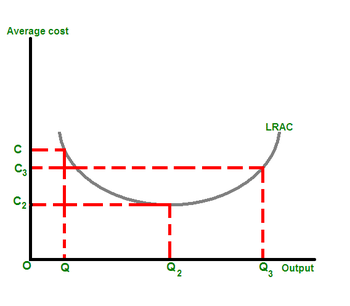
Ideal firm size
Encyclopedia

Competition
Competition is a contest between individuals, groups, animals, etc. for territory, a niche, or a location of resources. It arises whenever two and only two strive for a goal which cannot be shared. Competition occurs naturally between living organisms which co-exist in the same environment. For...
size for any company
Business
A business is an organization engaged in the trade of goods, services, or both to consumers. Businesses are predominant in capitalist economies, where most of them are privately owned and administered to earn profit to increase the wealth of their owners. Businesses may also be not-for-profit...
, in a given industry, at a given time; which should ideally correspond with the highest possible per-unit profit
Profit (economics)
In economics, the term profit has two related but distinct meanings. Normal profit represents the total opportunity costs of a venture to an entrepreneur or investor, whilst economic profit In economics, the term profit has two related but distinct meanings. Normal profit represents the total...
.
Discussion
If only diseconomies of scaleDiseconomies of scale
Diseconomies of scale are the forces that cause larger firms and governments to produce goods and services at increased per-unit costs. The concept is less well known than economies of scale.-Communication costs:...
were considered, then the ideal firm size would be one worker. However, economies of scale
Economies of scale
Economies of scale, in microeconomics, refers to the cost advantages that an enterprise obtains due to expansion. There are factors that cause a producer’s average cost per unit to fall as the scale of output is increased. "Economies of scale" is a long run concept and refers to reductions in unit...
also apply, which state that large firms can have lower per-unit costs due to buying at bulk
Bulk sale
A bulk sale, sometimes called a bulk transfer, is a sale of goods by a business that represents all or substantially all of its inventory to a single buyer unless such a sale would be common in the ordinary course of its business...
discounts (components, insurance, real estate, advertising, etc.) and can also limit competition by buying out competitors, setting proprietary
Property
Property is any physical or intangible entity that is owned by a person or jointly by a group of people or a legal entity like a corporation...
industry standards (like Microsoft Windows), etc. If only these "economies of scale" applied, then the ideal firm size would be infinitely large. However, since both apply, the firm must not be too small or too large, to be an ideal competitor.
Variation in ideal firm size by industry
The "diseconomies of scale" do not tend to vary widely by industry, but "economies of scale" do. An auto maker can buy millions of tons of steel for use in forming engine blocks and warehouse it indefinitely, if this will get a better price. A florist can't buy millions of tons of fresh flowers to sell, or they will wither before they are sold. This results in disparate interpretations of economies of scales for different types of organizations.Variation in ideal firm size over time
Note that the ideal size of a firm may also change over time, as industry and market conditions change. If a supplier finds a way to manufacture small batches of a major component at prices comparable to the large batch price, this will help small firms more than large firms. The same "diseconomies of scale" still apply, however, so now the ideal firm size will be smaller.Effects of agricultural, industrial, and service-based economies on ideal firm size
Also note that the basis of an economy will affect the ideal firm size. An agricultural society will tend to have small firms, as agriculture has a limited economy of scale (especially in the absence of refrigeration and other storage methods that allow for long term storage of large batches). An industrial society will tend to have large firms, as industry has a substantial economy of scale. A service-based economy will again favor smaller firms, as services have a limited economy of scale. There will, of course, be exceptions, such as MicrosoftMicrosoft
Microsoft Corporation is an American public multinational corporation headquartered in Redmond, Washington, USA that develops, manufactures, licenses, and supports a wide range of products and services predominantly related to computing through its various product divisions...
, which is a huge services company. This success may be attributed to getting a "jump start" on the competition with the Windows Operating System
Microsoft Windows
Microsoft Windows is a series of operating systems produced by Microsoft.Microsoft introduced an operating environment named Windows on November 20, 1985 as an add-on to MS-DOS in response to the growing interest in graphical user interfaces . Microsoft Windows came to dominate the world's personal...
. One could predict that as Linux
Linux
Linux is a Unix-like computer operating system assembled under the model of free and open source software development and distribution. The defining component of any Linux system is the Linux kernel, an operating system kernel first released October 5, 1991 by Linus Torvalds...
and other competing operating systems gain market share, this initial advantage will disappear, and the ideal firm size law
will once again apply, causing Microsoft to contract, as industrial giants like GM have in the
past.

